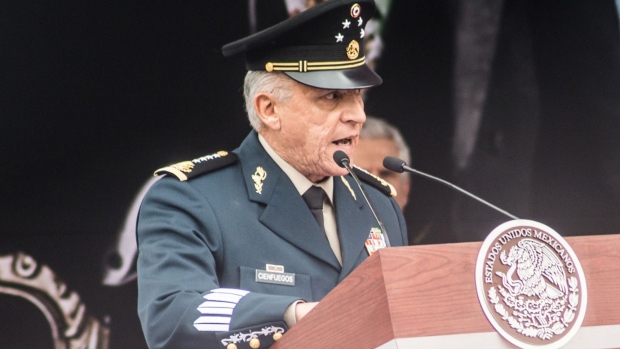Jan 16, 2021
Mexico Slammed by DOJ After Documents Released in Drug Case
, Bloomberg News

(Bloomberg) -- The U.S. Department of Justice criticized Mexico’s decision to publish information the agency says was given in confidence, and questioned whether the countries should continue to share documents.
In a statement, a department spokesperson said the DOJ was “deeply disappointed” in Mexico’s decision to close an investigation into former Defense Minister General Salvador Cienfuegos, who was arrested in 2020 on charges of working with drug traffickers.
Charges were dropped in the U.S. at Mexico’s request, and the general was sent to Mexico to be investigated by local authorities in November.
On Friday, Mexican President Andres Manuel Lopez Obrador said the U.S. case against Cienfuegos had been fabricated, and that the evidence had no value. The nation’s Foreign Affairs Ministry then released 751 pages of evidence put together by the U.S. that was meant to assist Mexican investigators.
“Publicizing such information violates the Treaty on Mutual Legal Assistance between Mexico and the United States,” a Department of Justice spokesperson said in a statement. The decision also “calls into question whether the United States can continue to share information to support Mexico’s own criminal investigations.”
The agency added that the published materials show the case against Cienfuegos was anything but fabricated.
“Those materials also show that the information relied upon to charge General Cienfuegos was lawfully gathered in the United States, pursuant to a proper U.S. court order, and in full respect of Mexico’s sovereignty,” the spokesperson said in the statement. “A U.S. federal grand jury analyzed that material and other evidence and concluded that criminal charges against Cienfuegos were supported by the evidence.”
Trust Broken
The DOJ’s complaints are the latest development in a skirmish between the two governments over the fate of Cienfuegos.
“Making public the entire file provided to the FGR will undoubtedly impact cooperation and information sharing, at least in the short term,” Maureen Meyer, Mexico Director at the think-tank Washington Office on Latin America, said of the Mexican attorney general’s office.
“A level of trust has been broken that will need to be repaired if both governments are to continue to cooperate on transnational criminal cases,” Meyer said.
The document released by Mexico was addressed to Foreign Minister Marcelo Ebrard, and alleges that while Cienfuegos was employed by the Defense Ministry, the general assisted and took bribes from the Patron-Sanchez drug trafficking organization in Mexico’s state of Nayarit.
“The evidence will show that he received bribes from the Patron-Sanchez organization in exchange for providing protection, safe passage of narcotics and weapons into Mexico City, and information about military and law enforcement operations in Mexico,” a letter to Ebrard says at the beginning of the document, which was posted by the Foreign Affairs Ministry in a tweet.
The DOJ says that the information was shared with Mexico in confidence, and that it continues to stand by its investigation and charges.
Mexico and the U.S. have been in a lengthy dispute over the general’s fate. In order to get Cienfuegos back on Mexican soil, Mexico threatened to cut cooperation, stating that the U.S. had violated a 1992 pact that all investigations dealing with the Latin American nation must be shared with Mexico.
In response to the outcry from Mexican authorities, the DOJ asked for the charges to be dropped, and a federal judge in Brooklyn agreed. Cienfuegos was returned to Mexico hours later, where the government told him he would be investigated by local authorities and allowed him to go home.
©2021 Bloomberg L.P.








